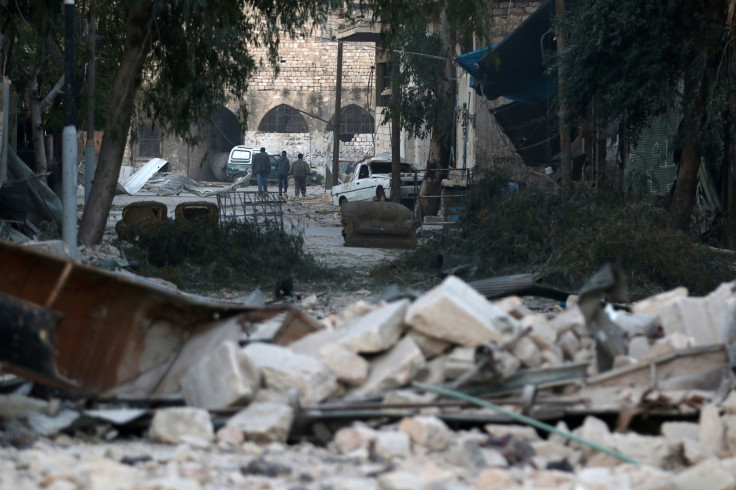Russia buried the Arab Spring in Aleppo – but Syria is just the beginning for Vladimir Putin
Russia has been dependable, forceful, and ruthless where America has been incoherent.
Vladimir Putin and his Syrian and Iranian allies are not waiting for Trump to step in this coming January to create new "facts on the ground" in Syria, even if Trump has expressed willingness to work with the Russian president. On the contrary, the Russian-backed regime is pushing ahead with an anticipated offensive against opposition-held areas of eastern Aleppo, "the mother of all battles".
During the past two days, the Syrian regime, alongside Iranian-backed militiamen and Russian air power, scored a critical victory over the Syrian insurgency by capturing almost a third of opposition-held Aleppo. The rest of the city will likely follow in the coming days or weeks.
This latest offensive is a turning point in the bloody civil war that raged in Syria since 2011. Aleppo was the country's most populated city, as well as the industrial heartland, and is now reduced to rubble. Pro and anti-Assad fighters fought and died in offensives that often resulted in only minimal changes to the battlefield.
Yet, following a two-day offensive and several months of siege and heavy bombardment, the opposition's defensive lines collapsed along with hopes that someone, somehow, would eventually save Aleppo. In Syria and beyond its borders, the victory of Assad and his Russian and Iranian allies is an earthquake whose consequences we have yet to grasp.
When Trump is sworn in come January, Putin and his allies will have created a new fait accompli in Syria. The Syrian army and its allies will likely capitalise on the victory in Aleppo to launch several other offensives in the Idlib, Homs, and Hama provinces near the Syrian coast.
On the other hand, opposition supporters will be faced with a choice to either "back down" and let the opposition face its fate, or "double down" by sending more weapons and military aid to the defeated insurgents. It is a choice they will have to seriously consider, as the global landscape is changing, and support for Assad's departure fading away.
Assad's claim that the regime was fighting al-Qaeda all along is indeed turning into a self-fulfilling prophecy.
As Trump steps in, Moscow may try to revive the political process based on new parameters that do not require Assad's departure, and could find some support in Washington and several European capitals. Russia will use these negotiations to continue deflecting international pressure and swallow the remaining parts of the Idlib, Homs, and Hama provinces the regime does not yet control.

In these regions, the defeat in Aleppo, feeling of abandonment, and perception that Turkey – one of the opposition's main supporters – is now only concentrating on the Kurdish issue rather than fighting Assad, will continue to reinforce the most extremist groups within the opposition. The al-Qaeda-affiliated al-Nusra Front, which recently rebranded itself into 'Jabhat Fatah al-Sham', will be able to cement its control over the remnants of the opposition. In that sense, Assad's claim that the regime was fighting al-Qaeda all along is, indeed, turning into a self-fulfilling prophecy.
Yet the consequences of what's unfolding in Aleppo will go beyond Syria's borders. The swift offensive is as much Assad's victory as it is Putin's. The West may be silent but, in the capitals of the Middle East and beyond, regional leaders are listening and observing. Five years after the wave of freedom and hope that swept into the region, it is now clear that revolutions can be crushed, they can be buried, they can be bombed into oblivion.
Where America has been hesitant, incoherent, and unreliable, Russia has been dependable, forceful, and ruthless. The deployment of the Russian naval fleet to the Mediterranean and indications that better access to the region is a strategic goal for Russia suggests that Syria is just the beginning for Moscow. Putin will use this clear military success to cement new friendships with the region's autocrats, who seek reliable partners to consolidate their power.
Leaders of the region will remember that Russia intervened at a time when its naval base in Tartus was threatened and its ally slowly losing ground. Having a Russian naval base might be the new and improved "nuclear program" for dictators: A safeguard against revolutions and foreign influence. Strongmen and autocrats of the region afraid of their own populations will remember: Aleppo is where the Arab Spring died.
Michael Horowitz is director of intelligence at Prime Source, a Middle-East-based geopolitical consultancy producing updates and analysis on the Syrian and Iraqi conflicts.
© Copyright IBTimes 2025. All rights reserved.






















